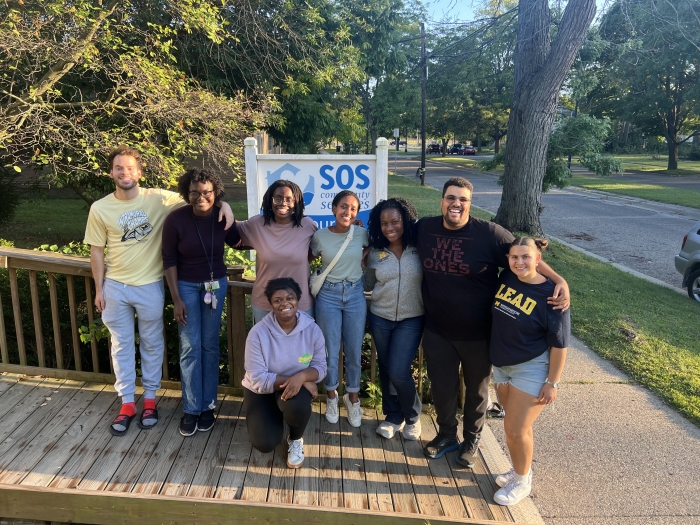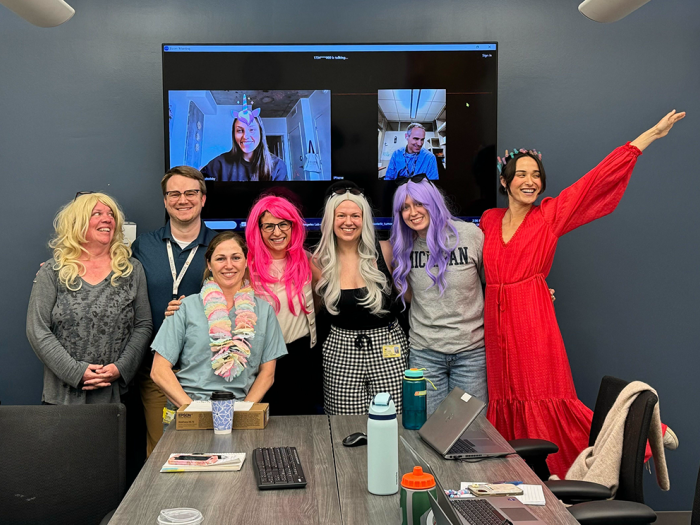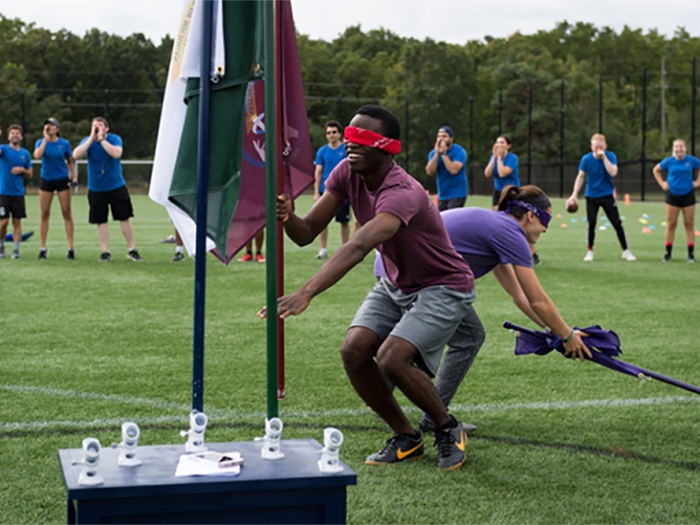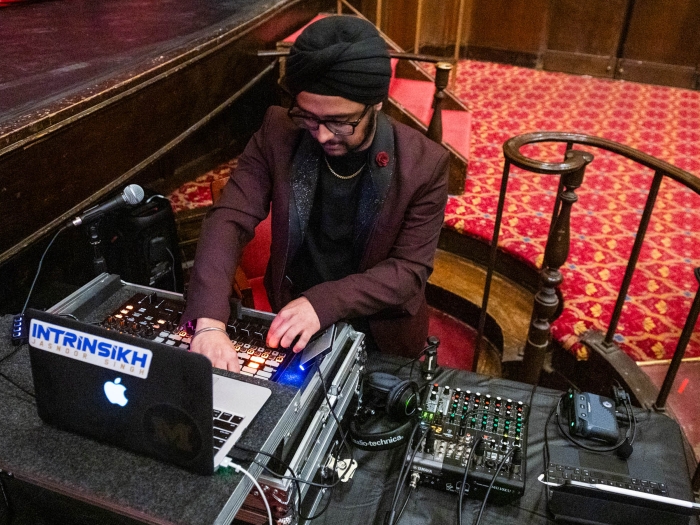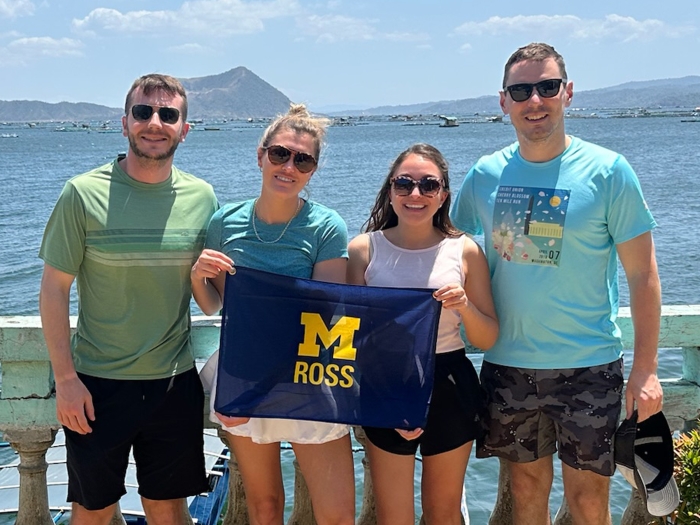
Grecia's Michigan Answer: I have been able to find ways to increase diversity in medicine through being involved in LANAMA, Student Diversity Council, Doctors of Tomorrow, and the Diversity in Medicine Conference.
M4 Grecia Quiroga, she/her/hers (pictured center above), is from Jackson, Michigan and graduated from the University of Michigan in 2018.
Here, she reflects on some of her favorite curricular and extracurricular experiences, and shares valuable advice on everything from pursuing a dual degree and managing wellbeing to finding a supportive community and creating a new experience at U-M after undergrad.
Follow her on Twitter @Grecia__Q.
What called you to explore a career in medicine?
In middle school, I remember going through challenging social and emotional moments because of a diagnosis that led to needing intervention and frequent follow-up, and remember being in awe of how physicians took their time to comfort me and my family in our most vulnerable movements. I was terrified of what could come next and didn’t know what the future held in terms of my health and well-being, but through compassion, patience and kindness, my doctors took their time to walk through each upcoming step in my medical journey. I immediately knew that I wanted to be just like them and made it my middle-school dream to one day become a physician. However, after learning more about medicine as a career and the structures of the health care system through my experiences as a patient, I became more aware of what I wanted my place in medicine to be.
As a first-generation immigrant, I saw that a lot of people from communities similar to my own struggled to gain access to health care, whether it was due to language barriers, transportation or misunderstanding of how the health care system worked. Thus, I made it my mission to pursue medicine so that I could improve the health care system and make it one that is equitable to improve the health of communities like my own by addressing health care disparities through my advocacy as both a physician and public health professional.
What have been your favorite parts or features of the med school curriculum so far, and why?
My favorite part of the medical school curriculum has been by far being able to start my clinical rotations in my second-year. At first, this intimidated me because I thought it was impossible to learn all of the basic science in one year and then start clinical rotations right away.
I remember being very nervous before my first day of the clinical trunk and wished that second year was still in the classroom – my place of comfort up until that point. However, after starting on the wards, I immediately felt grateful and honored to be in the clinical space because it reminded me of exactly why I wanted to pursue medicine and my reason for being in medical school.
Finishing the core clerkships in second-year also allowed me a vast amount of time for career exploration and personal growth during the Branches curriculum, which I appreciated as someone who enjoyed all of my core clerkships and found it hard to pin down exactly which specialty I wanted to pursue.
I’ve been able to rotate in the Branches through electives in Orthopedic Surgery, Ophthalmology, Adolescent Medicine, and Pediatrics. It’s been a lot of fun being able to learn from leaders in their fields!
Describe your favorite elective.
My favorite elective so far has been my Adolescent Medicine elective at the Corner Health Center in Ypsilanti, Michigan. I loved this elective because of how amazing Corner Health Center is and their impressive ability to provide a full range of health care, mental health and support services to adolescents from annual health exams to providing food from their pantry.
The Corner also provides gender affirming care for adolescents, which I thought was so important to learn about! It was a great experience learning from patients who come from such diverse backgrounds and engaging with the physicians who do the important work of helping adolescents transition from childhood to adulthood through their judgment-free and supportive care.
Why did you decide to earn a dual degree while in med school, what has the experience been like, and what advice do you have for others who are considering a dual degree in medical school?
I am currently pursuing a dual MD/MPH and am so happy that UMMS supported this opportunity! I am just starting out, but so far the experience has been very rewarding.
I'm in the Health Behavior and Health Education program under the School of Public Health and have enjoyed being able to dive into how to develop evidence-based interventions that influence positive behavioral changes in communities as well as how to effectively communicate with people regarding their health and change policies that help achieve health equity. It has provided me with a holistic view of what influences health and has gotten me thinking more about the impact I can make as a physician in the communities in which I work by applying a public health perspective that can impact more than just the individual. I'm looking forward to continuing to learn more about public health this year and how I can further incorporate what I learn in the classroom into the real world with the goal of reducing health disparities and achieving social justice.
My advice for others who are considering a dual degree is to talk to people who have done dual degrees in the programs you are interested in to get their perspective and make sure that it is a good fit. Think about if you want to go back to being in the classroom after being in the clinical space as well! This is something I didn’t think too much about but something that might be helpful to imagine yourself doing again after being away from a traditional classroom for some time.
Also, talk to physicians and practicing professionals about your goals in getting a dual degree so they can help you flesh out how you will incorporate your training in your other degree in your future career so that you can maximize your time during your dual degree to take classes and seek out opportunities that will help you gain the skills that you will need to achieve your future goals. One year goes by fast so make sure you have a plan of what you want to get out of it before you start!
What significant extracurricular activities have been a part of your medical education so far and how have they enriched your medical school experience?
Being part of the University of Michigan Student-Run Free Clinic has been one of my favorite experiences in medical school! I came into medical school because I was passionate about increasing access to health care and providing care to those who were un-insured/under-insured and wanted to find a space of likeminded people who also had similar goals, and UMSRFC gave me just that.
Through our work at UMSRFC, we are able to provide care to patients who do not currently have insurance or are under-insured in Pickney, Michigan (where UMSRFC is located) and the surrounding area. However, in addition to providing medical care, we also partner with Nursing, Social Work, Pharmacy and other professional schools to provide a vast array of services to the patients we serve. We also help patients identify if they are eligible for health insurance and assist patients with applying to receive health insurance.
Being part of UMSRFC since my M1 year has been very enriching because it allows me to put into action what I learned with the communities that need health care the most. I love how we put our heads together to solve problems that come up in clinic so that we can provide the best care for our patients. Our health care system is not perfect and many people fall through the cracks, but I am proud of UMSRFC for helping to increase access to care in Southeastern Michigan.
How do you manage your personal wellbeing as a med student?
Medical student life is hard, and I think it is important that we recognize that and talk about it! In the first couple months of medical school, I quickly realized that I needed to learn how to manage my personal wellbeing or else I was going to burn out fast. I thought that all I should do was study because there was so much information that I needed to learn, but thankfully I shifted my perspective to one of needing to take care of myself first so that I could learn how to take care of others.
I now manage my wellbeing by taking intentional time to engage in activities that fulfill me whether it is hanging out with my friends, visiting my family, reading a good book or going on a run. I used to feel guilty for doing these things, but learning to let go of the guilt early-on will help you so much in the long run.
Taking care of yourself is so important!!
How have you found community and/or support at UMMS? What would be your advice for prospective students seeking community and/or support?
One of my main sources of community and support at Michigan has been through the Latin American and Native American Medical Association (LANAMA). I remember being welcomed by LANAMA during my interview day and was so relieved to know that there would be a community waiting to welcome me with open arms.
As a Latina in medicine, it has been very comforting being able to turn to LANAMA for advice when things get tough because of our similar backgrounds and shared experiences. Being part of LANAMA truly feels like having a family away from home that will root for you and cheer you on every step of the way. I have found my best friends though LANAMA and have loved being able to not only have fun with LANAMA but also do impactful work with the Latinx and Native communities in the Ann Arbor and surrounding area.
My advice for prospective students seeking community is to not be afraid to reach out to members of organizations that you are interested in joining! There are so many clubs at UMMS, and everyone is always more than happy to have you join their organization and have you share in their community. If you don’t know where to start, consider talking to your student services counselor because they have a strong sense of what groups exist at UMMS. They can also be key points of contact within the MHOME program as well, which helps make the medical school community feel like home. If you identify as underrepresented in medicine, connecting with the Office of Health Equity and Inclusion is also super helpful.
What would you say to a prospective student who is considering the University of Michigan Medical School for their medical education?
University of Michigan Medical School will support you for exactly who you are and what you want to do in the world.
The culture at UMMS is one of wanting to empower you to become the type of leader in medicine that you want to be rather than shape you into their idea of who you should be, and I appreciate that so much. Everyone is remarkably supportive and will do whatever they can to help you achieve your goals. The students are incredibly nice and the education you will receive is world-class.
For students who went to University of Michigan as an undergrad, I thought my experience at UMMS would be similar to that of my time at U-M as an undergrad, but I was pleasantly surprised to find that it has been so different. Of course, I still go to Michigan football games and spent time studying in local coffee shops like I did in undergrad. However, the community you form while at UMMS and your life as a medical student will feel so different from undergrad, and your experiences as an undergraduate will enrich your experiences as a medical student.
For example, because of my connection with the undergraduate campus, LANAMA was able to help establish a mentorship program with undergraduate students who are interested in going into medicine who are in the Latinx Undergraduate Medical Association. If there are things that you wished existed while at University of Michigan or opportunities you did not get to explore during undergrad at U-M, then medical school is a great time to establish and explore something new!

